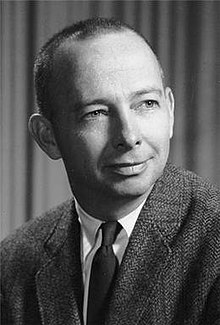William Weed Kaufmann(November 10, 1918 – December 14, 2008) was an American nuclear strategist and adviser to sevendefense secretaries,who advocated for a shift from the strategy ofmassive retaliationagainst theSoviet Unionin the event of a nuclear strike.
William Kaufmann | |
|---|---|
 | |
| Born | November 10, 1918 |
| Died | December 14, 2008(aged 90) |
| Nationality | American |
| Occupation(s) | U.S. military advisor, professor |
| Known for | Nuclear strategist |
Early life
editKaufmann was born in Manhattan on November 10, 1918, to Charles and Antoinette Kaufmann.[1]He was the fourth of six children. His father died when Kaufmann was 10 years old. He attendedThe Choate SchoolinWallingford, Connecticut,where his classmates includedJohn F. Kennedy.[2]He attendedYale University,earning a bachelor's degree in international studies in 1939.
Career
editKaufmann served in theUnited States Army Air ForcesduringWorld War II.After the war, he returned to Yale and earned a master's degree in 1947 and a doctorate in 1948, both in international studies.[1]
He was on the faculty at theYale Institute of International Studiesuntil 1951, when he was part of a group that left and foundedPrinceton University'sCenter of International Studies.[3]While at Princeton in the mid-1950s, he wrote "Limited War", a, paper that argued for expansion of the conventional armies ofWestern Europe,instead of a reliance on nuclear weapons, to forestall an invasion by the Soviet Union. In 1956, he was hired by theRAND Corporation.He became a member of thepolitical sciencefaculty at theMassachusetts Institute of Technologyin 1961 and also took a position that same year with theUnited States Department of Defense,splitting his time between both for several years.[1]Later he split his time between the Harvard Kennedy School and the Brookings Institution.
The vision ofcounterforce,developed by Kaufmann and others, was that the response to an invasion of Western Europe by the Soviet Union should be a measured sequence of responses, which would start with targeted attacks of military assets that could escalate to attacks on cities if hostilities were not suspended.[1]The hope was that an all-out nuclear war could be avoided. The counterforce proposal stood in contrast to themassive retaliationapproach advocated byUnited States Air ForceGeneralCurtis LeMayatStrategic Air Commandin which the US response to a Soviet invasion, even one without nuclear attacks, would be nuclear weapons on all major military and civilian sites in the Soviet Union and its allies, which could have resulted in hundreds of millions of deaths.[1]
Kaufmann was hired byUnited States Secretary of DefenseRobert McNamaraafter President John F. Kennedy took office, as one of McNamara'sWhiz Kids.McNamara included parts of Kaufmann's counterforce proposals into the nuclear strategy that he was developing.[1]
A 1986 article inForeign Affairscalled Kaufmann "the man who may well be the most knowledgeable individual in this country on the defense budgets of the past quarter-century."[2]
In a report written withJohn D. Steinbrunerin 1991 for theBrookings Institution,after thedissolution of the Soviet Union,Kaufmann opined that the US could meet its post-Cold Wardefense obligations after cuttingmilitary spendingby a third. The report noted that "the future ability of the United States to maintain the conditions of its security will depend as much on its moral authority, diplomatic skills and economic assets as on its military capabilities."[1]
Kaufmann died at 90 years of age on December 14, 2008, inWoburn, Massachusetts,of complications fromAlzheimer's disease.[1]
Doctoral students
editReferences
edit- ^abcdefghHevesi, Dennis."William Kaufmann, Nuclear Strategist Who Helped Reshape Policy, Dies at 90",The New York Times,December 21, 2008. Accessed December 22, 2008.
- ^abBernstein, Adam."Defense Expert William Kaufmann",The Washington Post,December 17, 2008. Accessed December 22, 2008.
- ^Levey, Stanley (April 23, 1951)."Six of Faculty Leaving Yale For Princeton in Policy Split"(PDF).The New York Times.pp. 1, 18.
- ^NATO's Nuclear Dilemmas, The Brookings Institution, 1983.